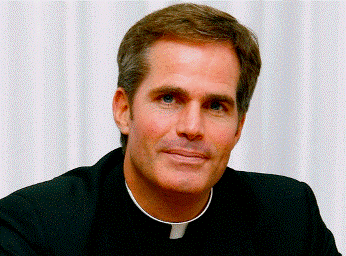A recent e-mail from friend and colleague Jamie O’Boyle directed me to a news story from The Catholic Sun, an online newspaper from the Dioceses of Phoenix, Arizona.
Father Thomas Williams, dean of moral theology at the Rome’s Pontifical Regina Apostolorum University in Rome, “who has appeared over the years as a church analyst for CNN, CBS, ABC and Fox News has been removed from public ministry after admitting he had a relationship with a woman ‘a number of years ago’ and fathered her child.

“[Williams] worked extensively for Sky News in Britain covering church and ethical issues. For both NBC and Sky News, the priest covered the final illness and death of Pope John Paul II, the 2005 papal conclave and the election of Pope Benedict XVI. Besides previous work for a number of networks, he was a consultant on Vatican affairs for NBC and MSNBC. He is the author of a 2008 book titled Knowing Right From Wrong: A Christian Guide to Conscience.”
“It seems like another example,” Jamie writes, “of the difference between ethics and morality. An ethical priest knows that it is wrong to have an affair. A moral priest doesn’t do it. Ethics is relatively easy. Morality is hard.”
Jamie’s comments imply a question that frequently comes up, namely: what’s the difference between ethics and morality? Jamie seems to suggest that morality carries a deeper level of commitment than ethics, and there’s some truth to that.
While there is considerable overlap, morals and morality tend to be associated with a more personal concept of what we believe and value as they relate to religion, sex, drinking, gambling, etc. The Catholic Church, as well as some cultures, look upon premarital sex as immoral behavior. For practicing Catholics, having sex before marriage is wrong.
Ethics refers to standards of conduct which indicate how one should behave based on moral virtues and principles arising out of beliefs about what is right, good and proper.
“Ethical values transcend cultural, ethnic and socio-economic differences,” writes ethicist Michael Josephson. The six, core ethical values of Trustworthiness (honesty, integrity, promise-keeping, loyalty), Respect, Responsibility, Justice & Fairness,Caring and Civic Virtue & Citizenship carry a universally applicable meaning within a code of behavior.
From the standpoint of ethics, premarital sex between two consenting adults would not be unethical as long as one is causing no harm to another.
In looking at the actions of Father Williams one could say that in having the affair, he was both unethical and immoral. He violated his vow of chastity – a specific occupational (and ethical) standard for priests in the church; and he acted immorally in violating church doctrine itself which not only forbids premarital but extramarital sex.
However, Jamie says, “An ethical priest knows that it is wrong to have an affair. A moral priest doesn’t do it.”
While that statement could be true, I cannot completely agree.
An ethical decision-maker not only demonstrates aconsciousness of what is right, good and proper behavior, they can be just as committed as a moral individual by practicing what is right, good and proper. In that sense, ethics is as easy or as difficult as morality. It all depends on the level of commitment by the individual. I do agree with Jamie’s suggestion that ethical behavior is driven by our cultural and personal moral values.
However, whether we call it moral integrity or ethical integrity, the intent should remain the same: strive to stand up for your beliefs about right and wrong; be your best self, resist political, social, and economic pressures that may cause you to act against what you know to be right, good and proper. And demonstrate the kind of commitment and courage to act out of your best self even when it may cost more than you want to pay.
Comments









